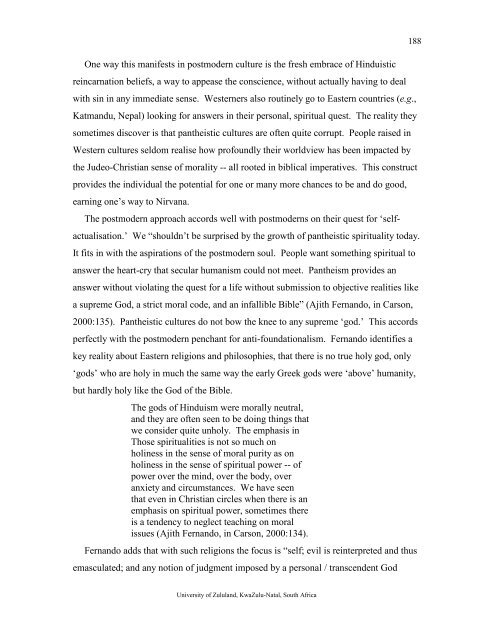Haase_UZ_x007E_DTh (2).pdf - South African Theological Seminary
Haase_UZ_x007E_DTh (2).pdf - South African Theological Seminary
Haase_UZ_x007E_DTh (2).pdf - South African Theological Seminary
Create successful ePaper yourself
Turn your PDF publications into a flip-book with our unique Google optimized e-Paper software.
One way this manifests in postmodern culture is the fresh embrace of Hinduistic<br />
reincarnation beliefs, a way to appease the conscience, without actually having to deal<br />
with sin in any immediate sense. Westerners also routinely go to Eastern countries (e.g.,<br />
Katmandu, Nepal) looking for answers in their personal, spiritual quest. The reality they<br />
sometimes discover is that pantheistic cultures are often quite corrupt. People raised in<br />
Western cultures seldom realise how profoundly their worldview has been impacted by<br />
the Judeo-Christian sense of morality -- all rooted in biblical imperatives. This construct<br />
provides the individual the potential for one or many more chances to be and do good,<br />
earning one’s way to Nirvana.<br />
The postmodern approach accords well with postmoderns on their quest for ‘selfactualisation.’<br />
We “shouldn’t be surprised by the growth of pantheistic spirituality today.<br />
It fits in with the aspirations of the postmodern soul. People want something spiritual to<br />
answer the heart-cry that secular humanism could not meet. Pantheism provides an<br />
answer without violating the quest for a life without submission to objective realities like<br />
a supreme God, a strict moral code, and an infallible Bible” (Ajith Fernando, in Carson,<br />
2000:135). Pantheistic cultures do not bow the knee to any supreme ‘god.’ This accords<br />
perfectly with the postmodern penchant for anti-foundationalism. Fernando identifies a<br />
key reality about Eastern religions and philosophies, that there is no true holy god, only<br />
‘gods’ who are holy in much the same way the early Greek gods were ‘above’ humanity,<br />
but hardly holy like the God of the Bible.<br />
The gods of Hinduism were morally neutral,<br />
and they are often seen to be doing things that<br />
we consider quite unholy. The emphasis in<br />
Those spiritualities is not so much on<br />
holiness in the sense of moral purity as on<br />
holiness in the sense of spiritual power -- of<br />
power over the mind, over the body, over<br />
anxiety and circumstances. We have seen<br />
that even in Christian circles when there is an<br />
emphasis on spiritual power, sometimes there<br />
is a tendency to neglect teaching on moral<br />
issues (Ajith Fernando, in Carson, 2000:134).<br />
Fernando adds that with such religions the focus is “self; evil is reinterpreted and thus<br />
emasculated; and any notion of judgment imposed by a personal / transcendent God<br />
188<br />
University of Zululand, KwaZulu-Natal, <strong>South</strong> Africa

















